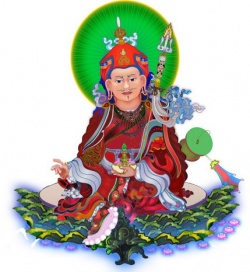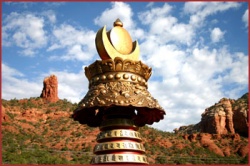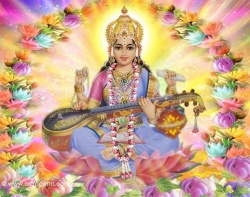Nonexistence of Self
By Paul Knierim
The idea of a self is fundamental, yet strangely inscrutable. "I exist" seems an obvious truth, but who is the "I"? Is there a single distinct "I" experiencing existence, or is it unfair to say that the "I" is distinct from the experience? Is it sensible to imagine there not being a self? Buddhist philosophy asserts that the conception of a separate self having the experiences is a mistake. Contradicting the assertions of the Samkhya and Yoga philosophies, Buddhists argue that the self is nothing more than an arbitrary label for a collection of parts.
In the view of Samkhya and Yoga, the self is an undeniable fact. Where there is a scene, it is argued, there is a witness. Where there is an observation, there is an observer. Where there is something known, there is a knower. The mind isn't properly described as being the self, for it's clearly known. Thoughts are all observations of their own sort, as they must pass before consciousness. Consciousness is of thoughts, therefore consciousness cannot be the thoughts themselves according to Samkhya and Yoga. In the Yoga-Sutra this argument is given against the mind being the self: "Whatever objects color the mind, that object becomes known.
That which becomes known is an object. That which is not thus known is purusa and is unknown" (482). Anything which is known must have a knower, so the known mind must be known by the true self. What's left over after the options of the self being the body or the mind are dismissed is a self which is a pure principle of observation -- consciousness in itself. This self, called purusa, is the eternal observer before whom temporary thoughts pass. We have a difficulty in that the self cannot be known (it being the knower of any knowledge, always the subject and never an object), but confidence that the self must be there since it's been logically derived.
The Buddhist rejects the self, preferring to say that it's no more than a label for a collection. Just as we label objects in the world around us arbitrarily, we invent an arbitrary label with the word "self" that has no reality beyond the parts. "Chariot" is a word we use to keep track of a conglomeration of descriptions: wheels, axles, reins, yoke, banner-staff, goading-stick, pole, et cetera. It isn't proper to say that these things unite to become the chariot because there's no real unification, the parts remain only the parts, it's just we who imagine some sort of unity by use of the word "chariot" as the unifier. Objectively there's nothing that "chariot" adds to what's there compared to if we didn't treat it as though it were unified... all the parts are simply all the parts, our label adds nothing. So it is as well with the self.
Nagesana explains this with reference to his own being in the Milindapanha: "Nagesana is but a way of counting, term, appellation, convenient designation, mere name for the hair of my head, hair of my body... brain of the head, form, sensation, perception, the predispositions, and consciousness. But in the absolute sense there is no ego here to be found" (284). The self is not form, not sensation, not perception, not predispositions, not consciousness... nor is it something else, nor is it the unification. The self is not to be found, it's only the invented label which is imagined to mean something but actually adds nothing to the picture beyond what was already there.
The Samkyha and Yoga philosophers may object to the fundamental ideas of the Buddhist conception as being incoherent, but must establish that their own view as more coherent if the objections are to be effective. The Buddhist is denying, it would seem, the most obvious facts of the world: that there are things in it and someone perceiving it. The existence of objects being known is proof of the existence of the knower, the objects cannot be known without a knowing subject existing. Patanjali's says of the mind, "It is not self-illuminating, being the knowable" (482). This proves there must be a self, as the fact of the knowable means something must be doing the knowing. The Buddhist seems simply self-contradictory, uttering such nonsense as "The Path exists, but not the traveler on it" (289). If someone is traveling the path, then the traveler on the path must exist, and to say otherwise is surely nonsense. The Samkhya philosopher, however, is in the situation of asserting the existence of something which is defined as unknown (because it's the knower) and impossible to experience (because it's the experiencer).
Many philosophers would argue that it's never proper to claim to existence of something which by definition can never be conceived of -- if you see the tip of an iceberg perhaps you can deduce the rest, but if you have no sample at all of what sort of thing it is then you have no business asserting it. The Samkhya idea of the purusa, then, cannot be trusted based on appeals to intuition unless there's some sort of sample of what it could be -- otherwise it might be more reasonable to say that the intuition that there's a subject for every object only applies to the experiences within the mind and is misapplied when used on the mind itself... for after all, we derived the intuition only from sense experiences. Perhaps Patanjali's sees these objections, for Yoga provides an attempt at showing a way to verify the existence of the self. In the Yoga-Sutra, Patanjali's believes he's showing a process through which the true purusa can be experienced in itself, the method to have the subject without any object. But how coherent, exactly, is the idea of self-observation? Surely it's the impossibility of self-observation that motivated the idea of an observing unobservable self to begin with, and if we're willing to assert self-observation we might as well assert the mind as doing it.
The idea that subject and object require each other was just moments ago being used to refute the Buddhist, so how then can we suddenly moving to talking about a subject by itself? If there can be no object without a subject, how can there be a subject without an object... how can there be any way to distinguish one to say that it exists, without the other being there to distinguish it? Logically, the consciousness in itself would have to be either total nothingness or an experience of another meta-self experiencer (which would lead to an infinite homuncular regress). It would seem then that the objections to Buddhism by Samkhya and Yoga philosophy are not especially strong, in view of how their alternative to the Buddhist falls victim to some similar attacks -- yet it remains worthwhile to see if the Buddhist can deal with the objections more easily, in order to determine if the views will be stuck on equally questionable footing.
The Buddhist position can be clarified to show how it sidesteps the problems it's accused of. The denial of self is not a denial that there are perceptions and consciousness, rather it's a denial of unity and a denial of absoluteness. There is a chariot so far as common talk goes, and it would seem nonsensical to deny that there's a chariot -- but we must remember that we're addressing the idea of a unified real absolute chariot, not just asking if the situation has arisen where in our language we're supposed to say "chariot." There is a chariot there, but only in a relational sense -- the relation of the parts to each other. It's entirely arbitrary to try to call that set of relations a unified whole, as it would be just as easy to extend it out and call the entire world a chariot. There's nothing in the relations themselves which says how many or what kind of relations to include in some sort of absolute unified whole... there's nothing in the parts of a chariot that says "I'm part of a chariot." The unified chariot, the absolute chariot, does not exist -- it's only what the senses and mind structures cause the mind to imagine. This carries over again to talking about the self -- the thesis in not that nothing exists, it's that things are only there in a relational sense (with arbitrary and fuzzy boundaries) rather than an absolute sense.
The chariot is the expression of the relation of parts, and so is the self the expression of the relation of parts. This is emphasized in the Visuddhi-magga: "When we come to examine the parts one by one we discover that in the absolute sense there is no tree; in exactly the same way the words 'living entity' and 'ego' are but a mode of expression for the presence of the five attachment groups, but when we come to examine the elements of being one by one, we discover that in the absolute sense there is no living entity there to form a basis for such figments as 'I am,' or 'I'; in other words, that in the absolute sense there is only name and form" (285). Our attempts to express an absolute reality of self are mistaken, for there is nothing there except exactly what's there. There is no unity, only relations which we hopelessly attempt to turn into unity. It's not that we're wrong to talk of things existing, it's that we're wrong to think we mean something absolute or unified by it, for on close inspection everything we call an object (including the self) is no more than relations.
The critic may still object that the Buddhist hasn't offered an account of how experiences exist. To this, the Buddhist may reply that experiences are made up of skandhas, skandhas being essentially aggregates or bundles. The five skandhas are form, sensation, perception/cognition, predispositions, consciousness. The most important as far as analyzing why experience seems to be as it seems to be is the consciousness. The consciousness (vijnana skandha) is the skandha which splits things into subject and object. This occurs when a sense organ (brain included) comes into contact with something -- it's here that the duality of experience is added.
Consciousness creates a split into experiencer and experience, a split which is not real beyond consciousness. Normally we think of experience being created by subject and object, because consciousness forces things into such description. In actuality, says the Buddhist, both the subject and the object are aspects of experience. The subject/object distinction is created by the consciousness aspect of experience, rather than being the reality of the way things are as the Samkhya or Yoga philosopher would have it.
Samkhya would have a self sitting in a movie theater watching life on the screen. The Buddhist would have nothing but the experiences on the screen, with no theater or viewer, and for that matter no screen. The Buddhist, instead of appealing to the necessity of a subject for every object that seems so natural, says that the subject/object distinction is illusory (an aspect of experience itself) and so eliminates the problem of looking for a self.
For the Buddhist, the knowing that goes on is only relational, parts relating to other parts. By avoiding the absolute sense of something being known, the Buddhist also avoids the implication of an absolute self. When the mind knows something, that's just a pattern of relations with no absolutes involved. There is no observer of the mind, for the thoughts stand without need of any absolutes to put them in context. When subject and object are illusion and reality contains neither subject nor object, there's no need to invent a self to fill the hole of "subject".
The nature of the self is a problem that has plagued philosophy from the earliest times. The Buddhist argues that this problem is a psychological problem -- the feeling of a need to find something that isn't there. If the self seems strangely inscrutable, that's because there's nothing there to examine. The quest for the unified self is doomed by the simple fact that there's nothing more there than what's there, there is no unity. If the subject/object distinction is truly illusory, then our intuitions of separateness and unified nature of a self opposed to a world are only a part of the nature of experience, and not an actual reality beyond.




